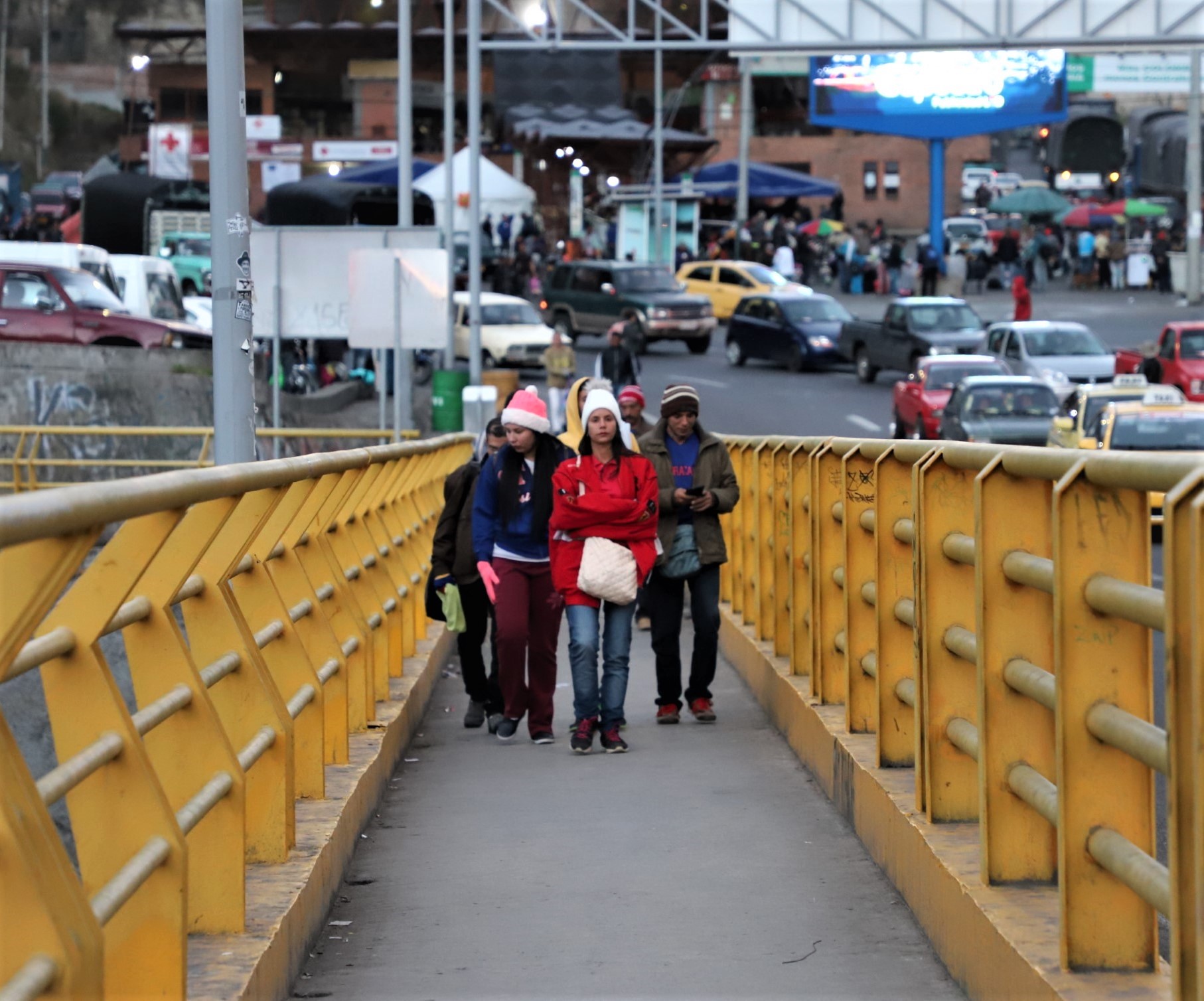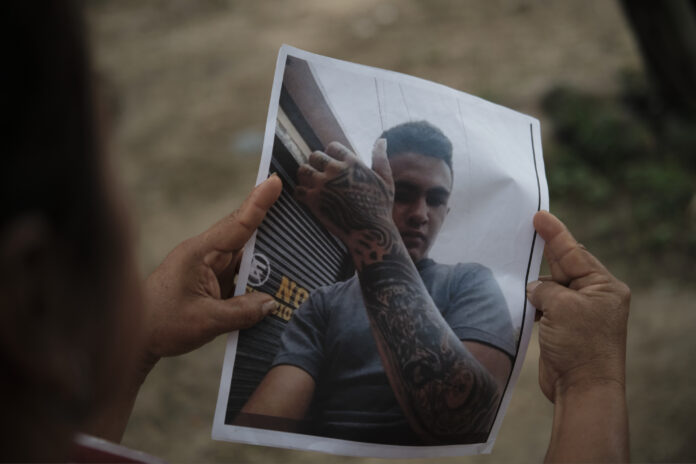Bernal Santana (26), his wife, Noeli Apontes (25), and their daughter, Valentina, recently walked for 16 days from Peru to Táchira, a Venezuelan border state. “We are exhausted, but it is like a victory, we are almost home. We are anxious to meet our family,” said Noeli. The family are in quarantine in a temporary shelter in Táchira and are still 400 km away from their home in the city of Maracay.
After more than a year away from home, Bernal and Noeli lost their jobs due to the COVID-19 lockdown. Now they face an uncertain future but are grateful to be back home.
The COVID-19 pandemic arrived in Venezuela in mid-March. The number of cases was kept relatively low in the first three months, but there has recently been a significant increase in cases.
The prolonged lockdown and quarantine measures have severely impacted the country’s economy and people’s livelihoods and exacerbated existing humanitarian needs.
An additional challenge for the country has been the return of tens of thousands of Venezuelans, who had lost their jobs in neighbouring countries because of COVID-19-related lockdown measures. Since 6 April, according to official figures, more than 74,000 people have returned to Venezuela.
The returnees
The Perez family returned to Venezuela after the father, Jesus (43), lost his job in a restaurant in San Jose de Guavira, Colombia, due to the lockdown. The family of four walked for 11 days to Venezuela, and they are currently under quarantine in a temporary shelter near the border. “There is nothing like your own country,” said Jesus. “We’ve been in lockdown for months with no jobs, we don’t know when it will end.”
Humanitarian organizations are providing assistance to returnees in temporary shelters managed by authorities.
.jpg?w=640&ssl=1)
.jpg?w=640&ssl=1)
.jpg?w=640&ssl=1)
.jpg?w=640&ssl=1)
.jpg?w=640&ssl=1)
Returnees from Colombia in an UN-supported temporary shelter during COVID-19 confinement in a border town in Southern Venezuela. Jesus (top middle)
Maribel Hernandez works as a nurse in Apure, a border town in southern Venezuela. She has never felt such a strong conviction to help save lives as she does now.
“As health-care workers we are committed to our patients and we took an oath to save the lives of all people,” she said.
.jpg?w=640&ssl=1)
Scaling up aid
Humanitarian organizations are scaling up response efforts in health care and other areas including water, sanitation, food security, nutrition, protection, shelter and education.
These efforts include the establishment of the international humanitarian architecture and a significant increase in the presence of the United Nations and its humanitarian partners across the country. Currently, some 121 international and national organizations are operating across all of Venezuela’s 24 states, which is a 99 per cent increase since early 2019. The number of UN staff in country has also increased from 285 in 2018 to more than 560 to date, with a presence in 20 states.
However more access is needed. Advocacy efforts are ongoing to increase the number of organizations operating in Venezuela and to overcome some of the main access challenges, such as logistical constraints, including access to fuel, and the politicization of humanitarian assistance.
.jpg?w=640&ssl=1)
.jpg?w=640&ssl=1)
.jpg?w=640&ssl=1)
.jpg?w=640&ssl=1)
.jpg?w=640&ssl=1)
.jpg?w=640&ssl=1)
UN agencies and partners have supplied essential services and supplies to communities in need.
The impact of aid
This year, with an increased capacity, humanitarian organizations have supported 3.3 million people with some type of assistance. More than 2 million people now have access to clean water and 1 million people received medicines and supplies. One million children have also received education support, 600,000 benefited from protection activities and 400,000 received food security support.
The Carvajales family are among the many families who have received assistance from humanitarian partners. They live in La Vega, a neighbourhood of red brick and tin roof houses perched on the hills surrounding the Venezuelan capital, where access to clean water and sanitation services is limited. Their two-year-old daughter, Evelys, was treated for severe acute malnutrition at a Caritas nutritional centre for five weeks until her condition improved. “I want to thank them because they saved my daughter and they are helping us,” said her mother, Evelyn. Without the treatment, there was a chance Evelys would not have survived.
Many families are also receiving vaccination support. Maria’s 5-year-old son, Albert, was vaccinated for measles in a health clinic in southern Venezuela. “I brought my son for immunization because I don’t want him to fall sick,” she said. “I know that immunization will strengthen his immune system, which will help him fight other diseases.”
Vaccination has been a key life-saving activity in Venezuela which has experienced several disease outbreaks. More than 3 million children were vaccinated in Venezuela in 2019.
Simona Epiayu, 50, is from the indigenous Waiyuu ethnic group. She works extremely hard to provide for her extended family of five, in north-west Venezuela. “Now the crisis has got worse and the economy failed. We have little money to buy food. We are fighting to stay alive,” she said. Simona has received food and non-food items from aid organizations. In 2020, more than 396,000 people received food security support including food, cash transfers and seeds to improve livelihoods.
.jpg?w=640&ssl=1)
.jpg?w=640&ssl=1)
.jpg?w=640&ssl=1)
.jpg?w=640&ssl=1)
Maria with her five-year-old son (top). Evelyn with her daughter Evelys (left). Simona Epiayu (centre).Venezuelan Red Cross is providing nutritional assistance to malnourished Yukpa children (right).
Impact on the economy
The COVID-19 pandemic is expected to further impact the economy and lead to an increase in unemployment and poverty rates, that would exacerbate humanitarian needs.
Luz and Nelly take care of their seven grandchildren in Cardenas, in the southern state of Táchira. They worry every morning about how to feed the children, as the COVID-19-related restrictions are hampering their ability to put food on the table for their family. The informal jobs they had before are no longer available. “This disease has affected everything in our life,” said Luz. “We can’t go out and look for work. We are drowning, locked up, worried…We need to work to support our grandchildren until their mothers can return home.”
Luz, Nelly and their grandchildren receive support from humanitarian organizations such as food, hygiene kits and nutritional supplements.
.jpg?w=640&ssl=1)
Luz and Nelly take care of their seven grandchildren in Cardenas, in the southern state of Táchira.
Appeal for funding
To address the humanitarian situation, including the COVID-19 pandemic, the UN and partners launched the 2020 Humanitarian Response Plan, which is focused on providing life-saving assistance, facilitating access to essential goods and services and ensuring protection for the most vulnerable. The Plan requires US$765.5 million to assist 4.5 million people, with just over $135 million received to date. More financial support is urgently required so that aid organizations can continue to support people in need in Venezuela.
Without more timely funding, humanitarian operations will be severely affected putting thousands of lives at risk.
.jpg?w=640&ssl=1)
.jpg?w=640&ssl=1)
UNHCR and OCHA staff during the distribution of solar lamps, jerry cans and coal to indigenous Wayuu community.
Footnotes
All photos OCHA/Gema Cortes




